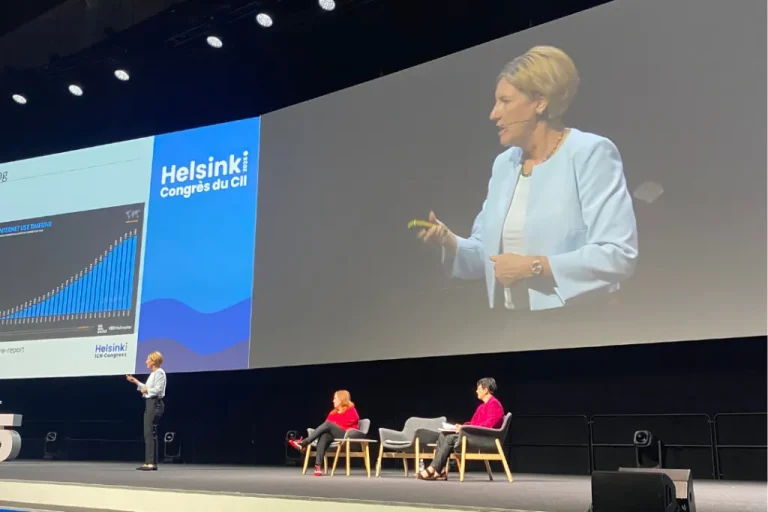Senior nurse academics have argued that nursing should be seen as a “hardcore” science, technology, engineering and mathematics (STEM) profession.
At the 2025 International Council of Nurses (ICN) Congress, Professor Janelle Yorke, head of the Hong Kong Polytechnic University School of Nursing, and Dr Tracie Risling, associate dean for innovation at the University of Calgary’s Faculty of Nursing, addressed attendees on the topic of digitisation and technology.
“We have some lack of professional confidence when talking about who we are and what we do”
Janelle Yorke
Professor Yorke spoke about the opportunities, advantages and potential threats of new technology such as artificial intelligence (AI) to nursing and why she felt it was important for nurses to assert themselves as scientists in healthcare systems increasingly reliant on technology.
She told the conference, taking place in Helsinki, Finland this week, that nursing was not currently, in most countries and education systems, considered a STEM discipline.
She said: “Why is it so hotly debated, not just with our colleagues – our medical [and] allied health colleagues, education departments, governments – but within nursing ourselves?
“Do we recognise ourselves as a STEM discipline? It’s hotly debated because nursing is still seen as a soft science, and this comes back to the narrative that we use to try and explain what it is that nurses actually do.”
Professor Yorke added: “We do suffer from gender bias… we still suffer from sexism and being discriminated against.
“We know that because of the disparities in salary, so this also impedes nursing being recognised as a hardcore [discipline] based in science.
“I would also say that we have some lack of professional confidence when talking about who we are and what we do.”
Professor Yorke spoke about the work nurses had already been doing that demonstrated that they were worthy of the title, including that being done by UK chief nursing information officers, an increasingly common role across the NHS.
“I’d argue that these nurses are absolutely demonstrating STEM every single day in their practice,” she said.
Professor Yorke added, however, that even nurses who are not specialising in informatics should be considered as practising STEM.
She showed attendees an image of an intensive care unit bed attached to a series of monitors and apparatuses, adding: “This is nursing STEM in one picture.
“I was once a critical care nurse… only a nurse can walk into this room and think: ‘Yeah, I’ve got this. No problem.’
“Things are beeping, drips are running, there’s a ventilator, you’re checking arterial blood gases, weaning the inotropes, looking at the ventilation – only a nurse could do all of that, do it effectively and safely, as well as attend to the person-centred care that the patient in that bed needs.”
She further pointed to the bread-and-butter work of nurses as further proof of nursing as a ‘hard’ science such as drug calculations and data entry.
She said that, in the US, STEM degrees were given priority for central government funding, exceptions on immigration rules and other benefits.

Tracie Risling
“If you’re allocated as a STEM discipline, you automatically get access to a lot of money,” she said, adding: “Nursing misses out on all of that.”
Professor Yorke explained that, in her view, such recognition was crucial to boosting the profile of nursing and that nurses should “claim the land” inside the category of STEM.
Dr Risling, meanwhile, focused her speech on the emerging role of AI in healthcare.
“We can run but we can’t hide,” she said, referring to what she described as the inevitable march of AI.
She called for nurses to grasp the nettle by actively helping to develop “AI for good”, to ensure it helped improve healthcare outcomes and aided the profession.
Nurses also had a role in combating misinformation caused by the poor use of these tools, and to develop new nursing roles in relation to AI, she added.
Doing this, Dr Risling said, required nurses to understand the technology and get involved in its development.
“People trust AI way too much,” she said. “Patients are searching online, they are being delivered misinformation that is being generated by AI.
“This is what we have to prepare to deal with, to stand against.”
“AI still needs some heart, and there is absolutely a nurse for that”
Tracie Risling
Dr Risling described AI as a “cherry on top” of nursing practice, and something that could act alongside, and not replace, the work of nurses.
She added: “We have to prepare for this moment. It’s not a replacement, it’s a collaboration where we will work together.
“I want you actually to think about IA – intelligence amplification, because this is how we will use this technology.
“And the other thing that I want you to really take away with you is the fact that in all of this science, AI still needs some heart, and there is absolutely a nurse for that.”
More from ICN Congress 2025

